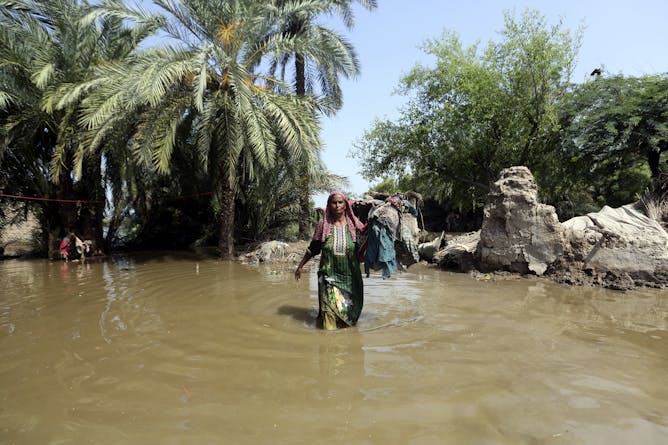|
The recent extreme flooding in Pakistan has been attributed to rising temperatures due to climate change. Pakistan produces less than one per cent of global greenhouse gas emissions, however, higher-than-normal monsoon rains and accelerated glacier melts submerged one-third of the country.
Today in The Conversation Canada, Zafar Adeel at Simon Fraser University points out that developing countries are disproportionately impacted by extreme weather caused by climate change. As such, he writes, “the onus of helping Pakistan recover from this tragedy, therefore, rests on the international community.”
Adeel points out that developing countries will need support and assistance to enhance existing infrastructure to adapt to climate change. And that regional cooperation is necessary to mitigate the effects of extreme weather events.
Also today:
|

A woman wades through a flooded area after heavy rains in Sindh province, Pakistan.
(AP Photo/Fareed Khan)
Zafar Adeel, Simon Fraser University
Pakistan contributes less than one per cent of greenhouse gas emissions, but has disproportionately felt the impact of climate change.
|

It is not just the number of words that children hear that is important — the quality of the language children hear also matters.
(Shutterstock)
Audrey-Ann Deneault, University of Calgary; Lorraine Reggin, University of Calgary; Penny Pexman, University of Calgary; Sheri Madigan, University of Calgary; Susan Graham, University of Calgary
Given the clear importance of language skills for lifelong outcomes, it is critical to set children up early for language success.
|

Vladimir Putin appears larger than life on screen as he addresses an audience at the Luzhniki Stadium in Moscow on the eighth anniversary of the annexation of Crimea in March 2022.
(Vladimir Astapkovich/Sputnik Pool Photo via AP)
Alexander Hill, University of Calgary
There’s no question the Russian population is subject to a Russian media largely loyal to the Kremlin. But that doesn’t mean Vladimir Putin lacks genuine supporters.
|

Bill C-18, the Online News Act, is trying to get the dominant digital platforms to negotiate mutually-acceptable agreements with Canada’s online news outlets.
(Shutterstock)
Ricard Gil, Queen's University, Ontario
There’s no evidence that news outlets are worse off because of Google, Facebook and other aggregators. If anything, evidence shows that, overall, news outlets would be in worse shape without them.
|

shutterstock.
David Crête, Université du Québec à Trois-Rivières (UQTR)
La combinaison « langue de bois et cassette » des personnalités publiques est un ingrédient de plus qui vient nourrir l’ennui chez le citoyen, et favorise les haut taux d’abstention aux élections.
|
Arts
|
-
Raluca Radulescu, Bangor University
Dragons have been used for political manoeuvring throughout the history of Britain.
|
|
Health
|
-
Nina G. Jablonski, Penn State
Our ancient ancestors didn’t have clothes or houses – but that constant exposure to the sun helped their skin protect itself from the worst sun damage.
|
|
Science + Tech
|
-
Emily Blackwell, University of Bristol
Science has some clues about whether or not your cat feels more than cupboard love for you.
|
|